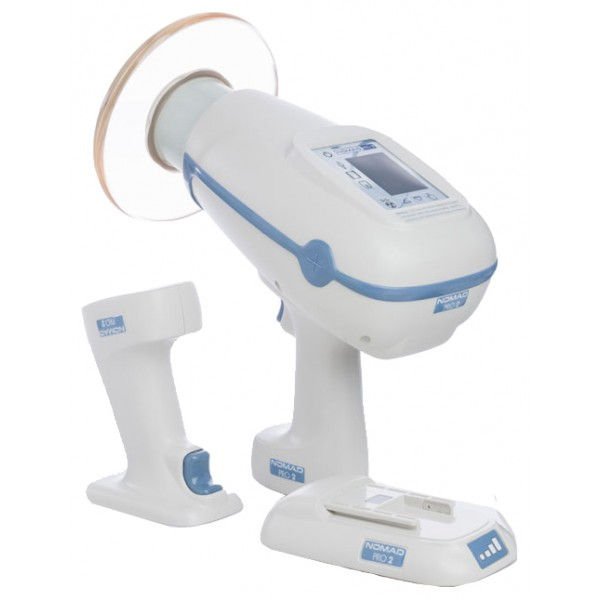Handheld X-Ray Unit & Monitoring

It seems like a handheld X-ray unit is the way to go . . . is it?
Maybe yes . . . probably no
By Kevin Christian, LLC
Airbex Nomad Handheld X-ray Units have many advantages, and many disadvantages.
Let me start with the disadvantages.
Cons:
1) You must get the state’s approval for use prior to purchase. This is unlike the normal protocol which calls for declaring a purchased unit to the state within 10 days. With the handheld, you must contact Robert Young, the Device Manager for the Division of Radiological Health. He will send you a letter requesting more information about your facility, the use and training procedures for the unit, the security against theft, etc.
2) You will have to begin using film badges – both whole body badges and ring badges. The most popular NVLAP approved companies for dosimetry are Landauer, Global Dosimetry, and Radetco. Film badge expenses can run over $1000 per year depending on the office, so keep that cost in mind when you purchase.
3) These units are portable, handheld, and weigh about as much as a half-gallon of milk . . . so
they can – and have – been dropped.
4) They run on batteries. One client told me that they had to recharge after an FMX.
5) They have to be locked up after every use.
6) On busy days, during peak demand, a bottleneck can form for everyone needing the unit at the same time.
7) There is an FDA warning about units purchased overseas, so make sure you are certain about your supplier.
8) These units are still illegal in some states (Alabama, for example), and were illegal in Tennessee up until recently. There is also legislation afoot in many states that would make it illegal to have only one handheld unit in an office to serve all of the X-ray needs.
9) They are around $9,000, or roughly 2x the cost of a standard unit.
Pros:
1) These devices are great if you have surgical privileges at a hospital that does not have an X-ray unit.
2) They are ideal for trauma or triage scenarios.
3) They are perfect companions for mission trips where a laptop, a sensor, a Nomad, and several back-up batteries could set you up for a day or two of dentistry in the jungle.
4) They are great for military use.
I hope this helps clarify the issue in your mind as you decide whether a Nomad is right for you. – Kevin Christian
To contact Kevin: [email protected]
A word from Olivia Wann: Please give Kevin Christian a call to assist you with your inspections. If you are one of our subscribing clients, we will add NOMAD specific information to your OSHA Manual. For economical dosimetry service, contact our friends at ProEdge (888) 843-3343. Remember – you must train your staff on the use of the NOMAD Please see training video at https://www.youtube.com/watch?v=UF1bL-nt0H4 and contact the manufacturer for support materials.




